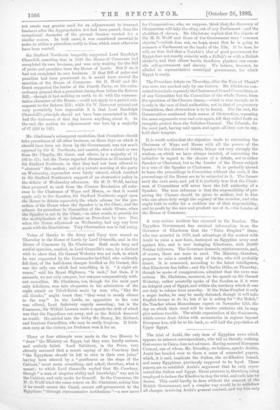Three or four attempts were made in the two Houses
to " draw " the Ministry on Egypt, but they were hardly serious, and entirely failed. Lord Salisbury, in the Peers, very cleverly assumed that a recent saying of Mr. Courtney that "the Egyptians should be left to stew in their own juice," having been uttered by a "gentleman on the steps of the Cabinet," must mean something, and asked, therefore, what it meant ; to which Lord Granville replied that Mr. Courtney, though "a man of singular ability and knowledge," was not in the Cabinet, and only spoke for himself. In the Commons, Sir D. Wolff tried the same course on Mr. Gladstone, asking him if he would secure the Canal, ensure self-governmint to the Egyptians "through representative institutions "—a new move for Conservatives, who, we suppose, think that the discovery of Obstruction will take the sting out of any Parliament— and the abolition of slavery. Mr. Gladstone replied that the objects of Sir H. D. Wolff and those of the Government were " amnion objects,"—which does not, we hope, mean that he is going to summon a Parliament on the banks of the Nile. If he does, he will, we fear, find that a Notable's idea of good government for Egypt does not exactly coincide with a Fellah's or with a British: elector's, and that others beside Southern planters can recon- cile self-government and slavery. We believe, however, he- alluded to representative municipal government, for which Egypt is ready.


































 Previous page
Previous page